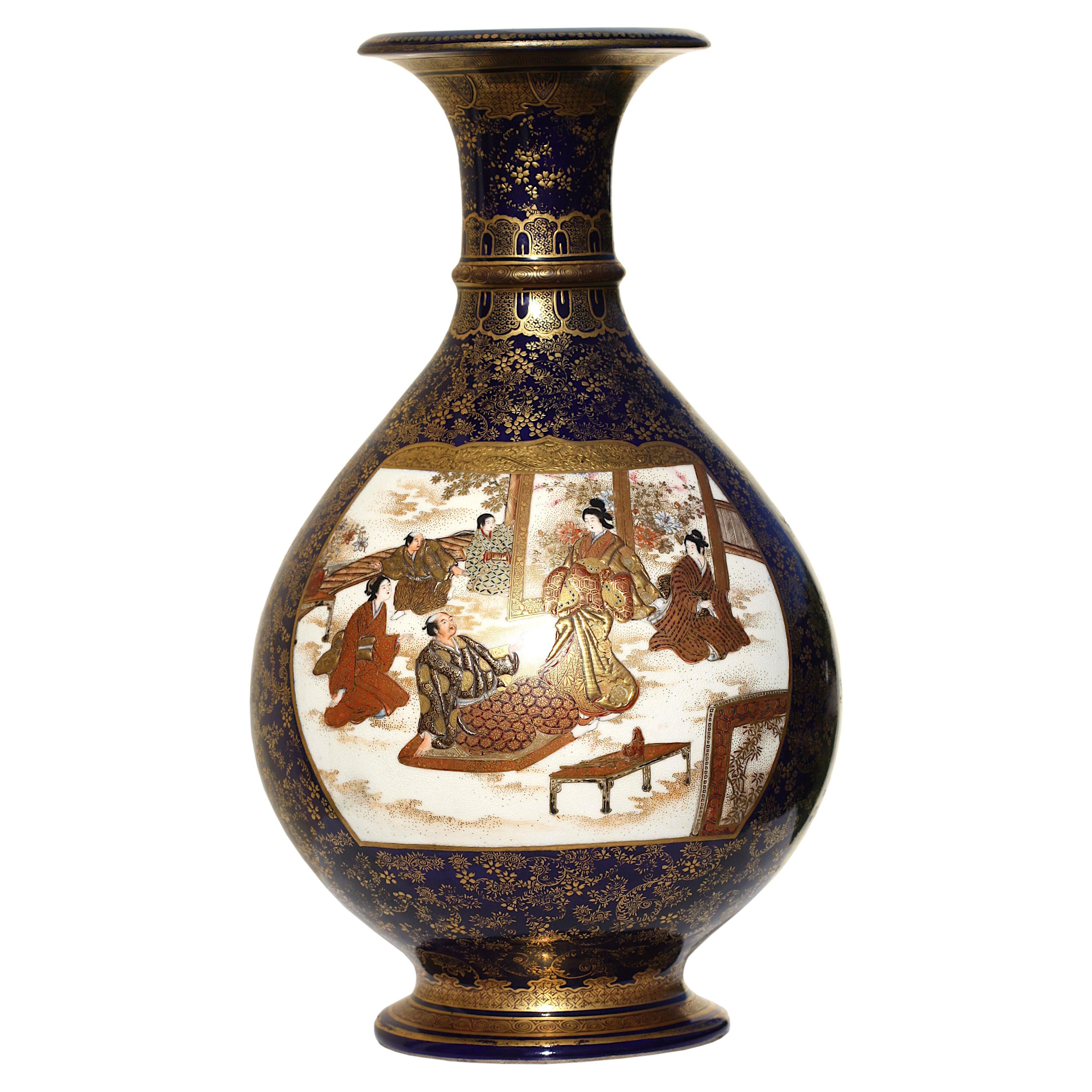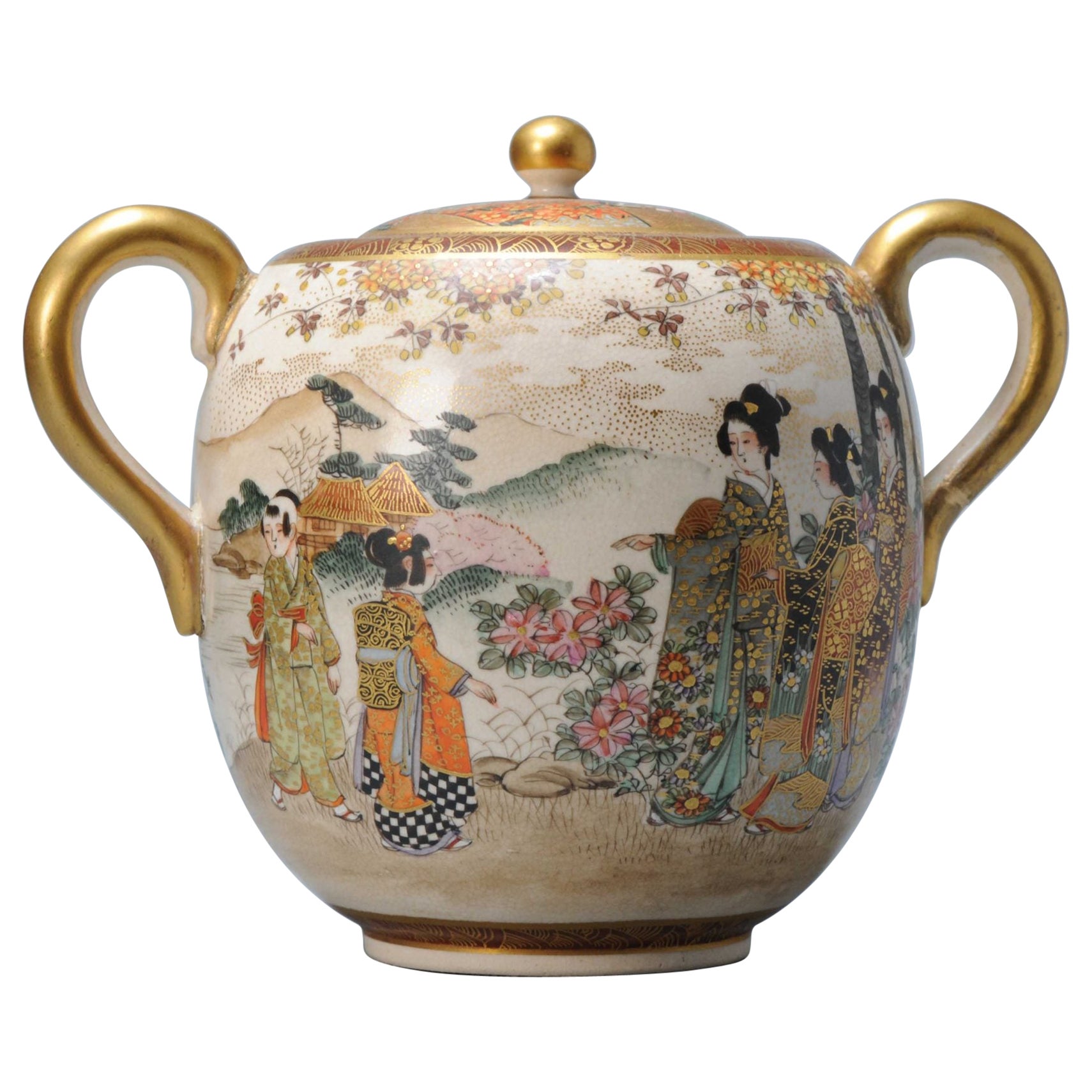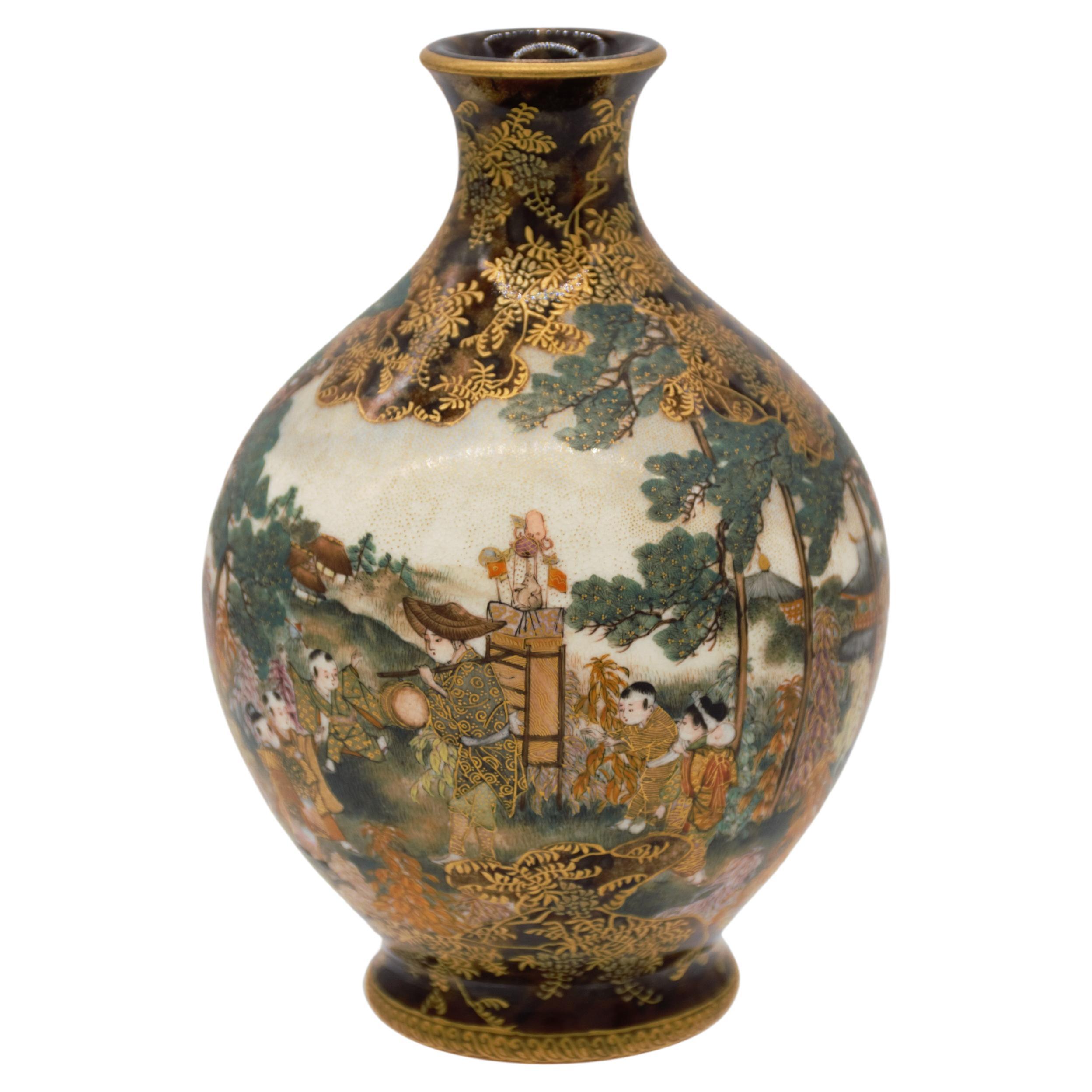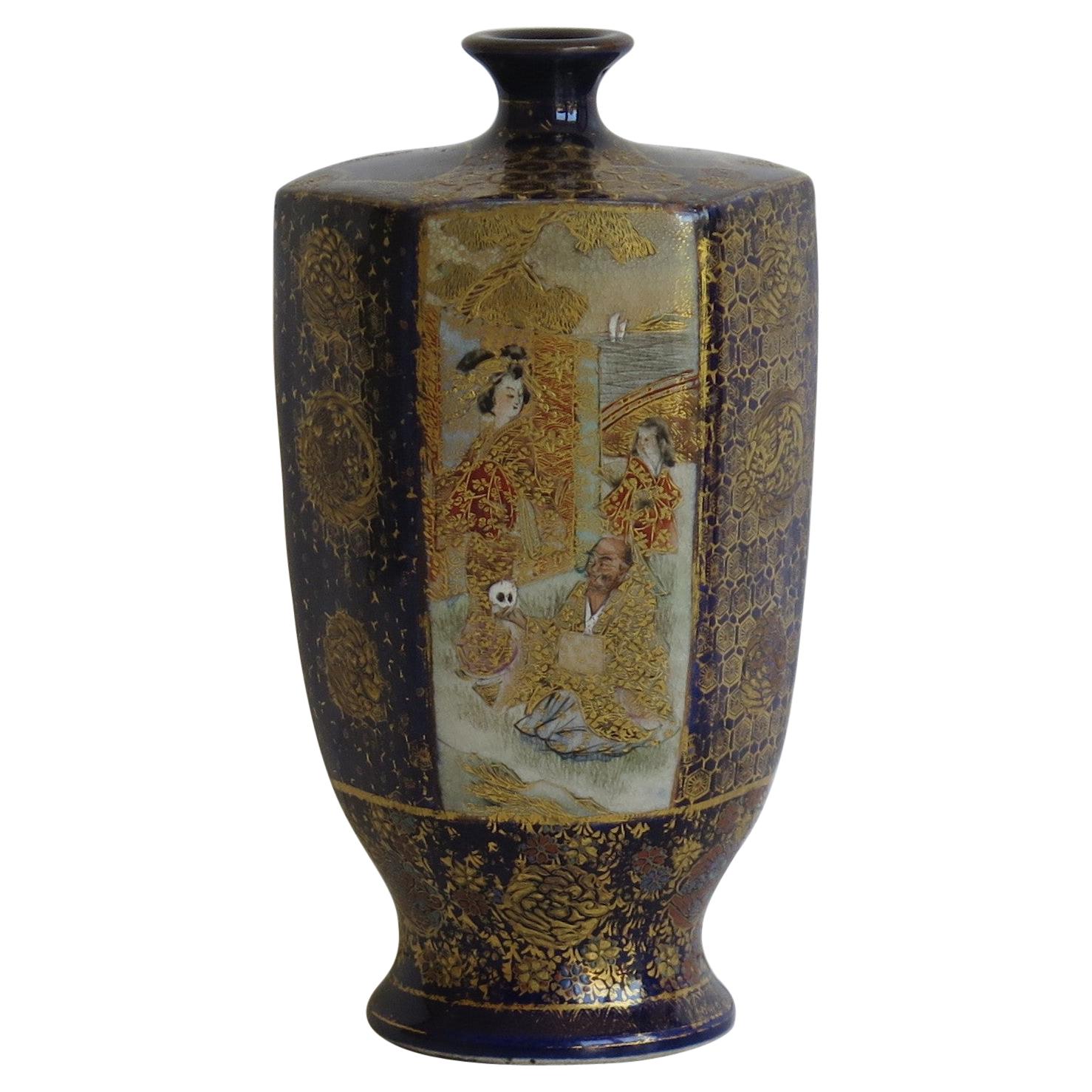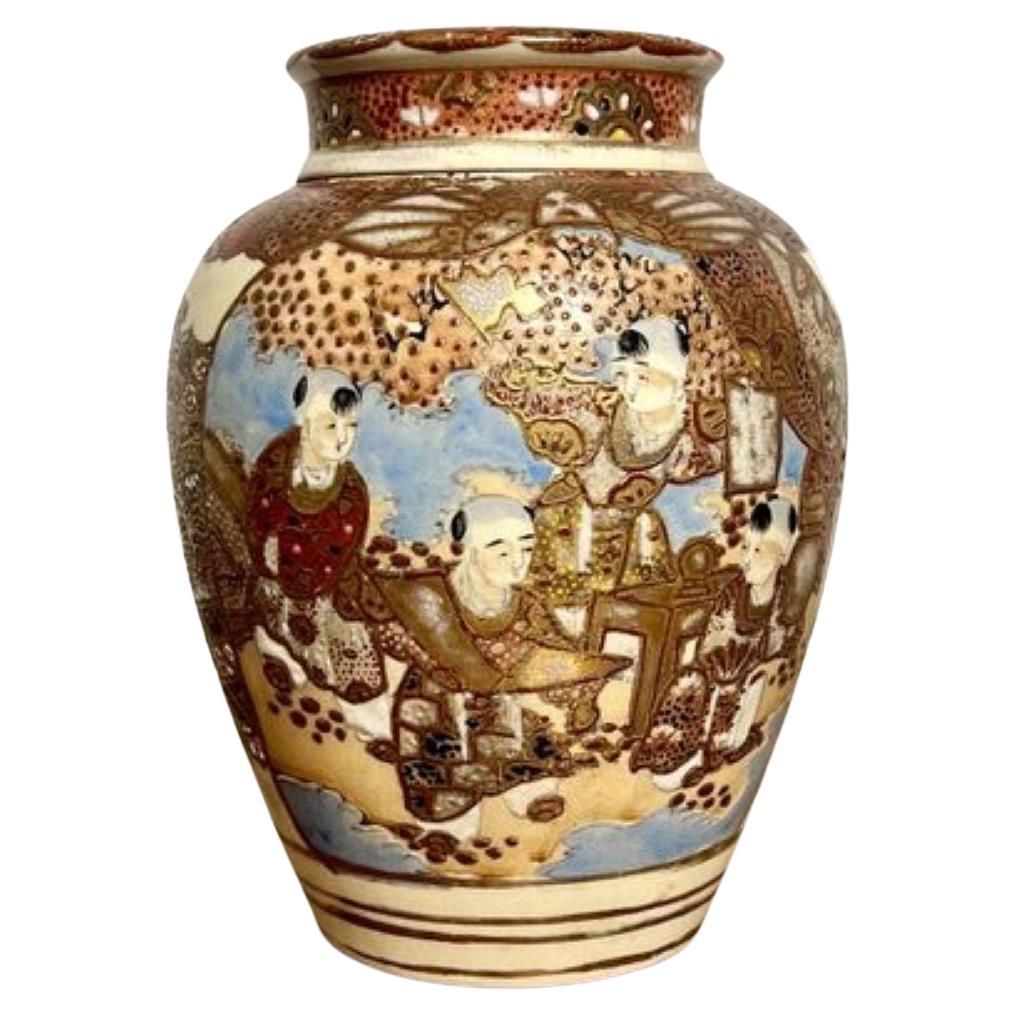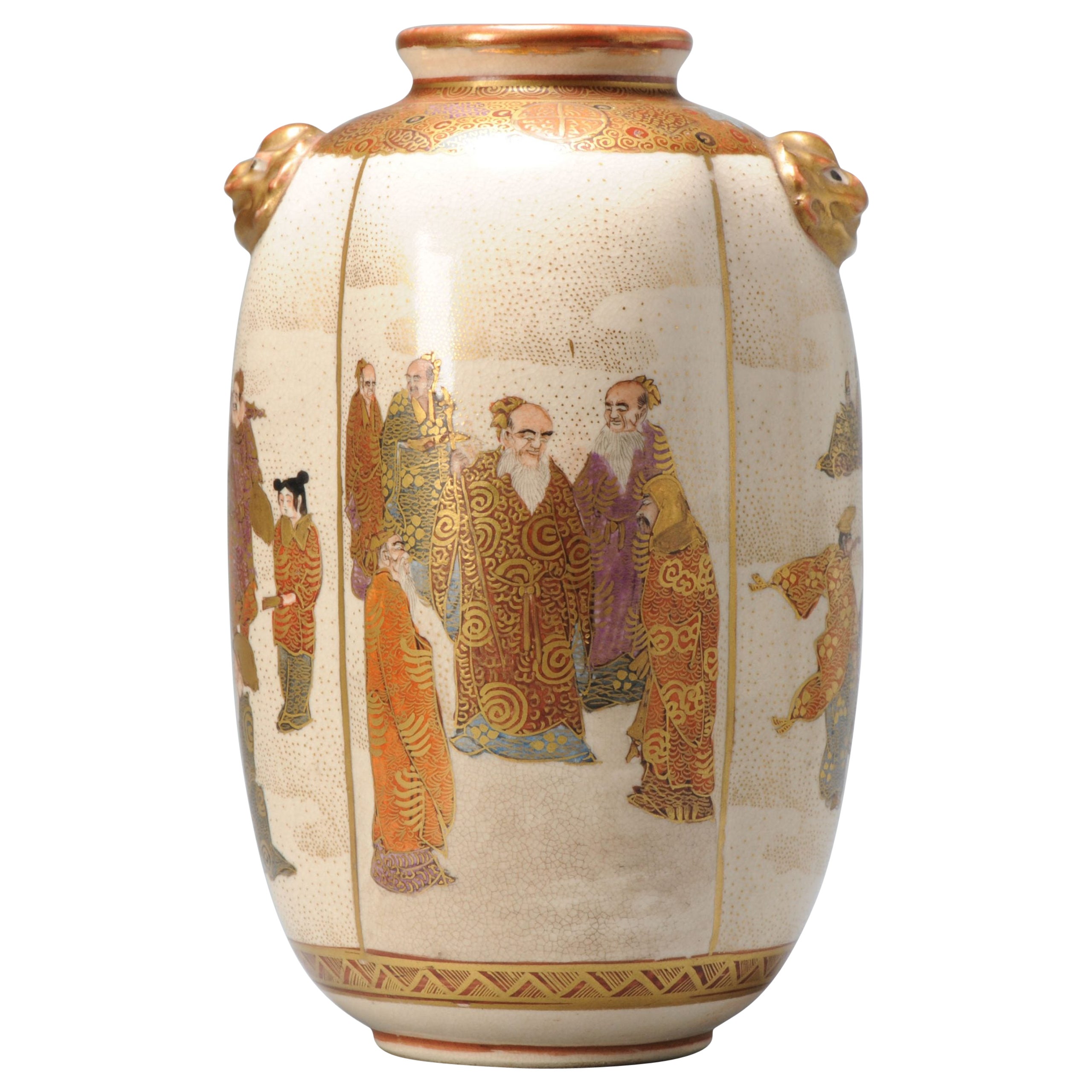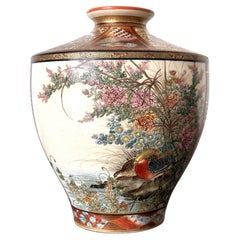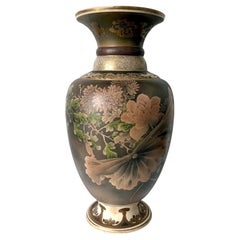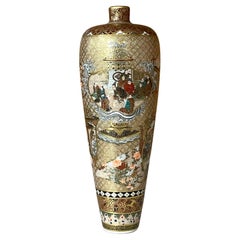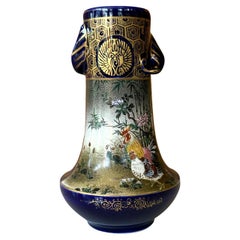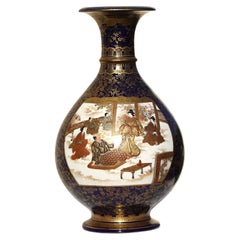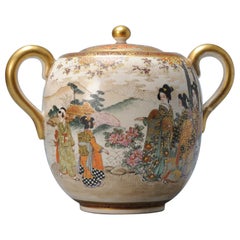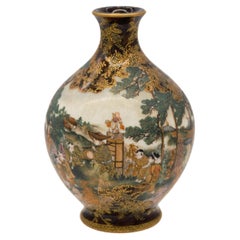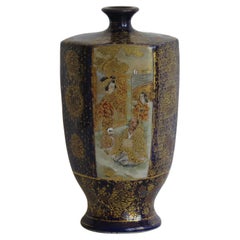Items Similar to Fine Japanese Satsuma Ceramic Jar with Gilt Decoration by Kinkozan
Want more images or videos?
Request additional images or videos from the seller
1 of 21
Fine Japanese Satsuma Ceramic Jar with Gilt Decoration by Kinkozan
$6,000
£4,587.32
€5,283.67
CA$8,407.84
A$9,386.56
CHF 4,918.42
MX$114,900.74
NOK 62,463.95
SEK 58,895.58
DKK 39,432.54
About the Item
A large Japanese ceramic vase from end of Meiji period circa 1880s- 1910s by Kinkozan (1645-1927). One of the largest studio manufacturers of the export ceramics at the time based in Kyoto. In the typical style of satsuma made at the turn of 20th century, the vase is of a moon jar shape and finely decorated with kinran-de (gold paint) on a cream white background with even fine crackles. What sets this particular vase apart from many lower quality and mass-produced pieces is the meticulously renditioned surface decoration. Lavishly gilded with a continuous design, the carefully composed imagery depicts an elaborately decorated float cart in a festival parade. A group of people are seated within the float with a woman and a child standing in the front. Surrounding the float are streams of marchers dressed in ceremonial outfits, each with distinct pattern, as well as pedestrians going about their own business and bystanders. The parade depicted here is likely the Gion Matsuri Festival, which takes place annually in Kyoto from July 17th to 24th. It is known for the Yamanbako Junko with lavished decorated floats. Interestingly, the float here carries a Migi Mitsu Tomoe Mon which was used to identify specific sponsors of families or shrines. The mouth and base are decorated with gold bands of floral designs and archaic key pattern. Signed "Made by Kinkozan" underneath in a red seal and Nippon.
The composition is well-balanced with motion and dimensional depth in mind, very much a snapshot of the moment. The painting was finely executed with no details overlooked. As a large piece, the superb workmanship can be compared to the miniature work from the studio and those by Yabu Meizan and Seikozan.
Come with vase is a page of an auction catalog. It appears that the vase was purchased in 1982 from Gallery Sixtyeight which is no longer in business.
- Creator:Kinkozan (Manufacturer)
- Dimensions:Height: 12.2 in (30.99 cm)Diameter: 11 in (27.94 cm)
- Style:Meiji (Of the Period)
- Materials and Techniques:Ceramic,Enameled
- Place of Origin:
- Period:
- Date of Manufacture:1880-1910s
- Condition:Wear consistent with age and use. Minor surface age wear such as gilt rubbing around the rim. Slight gilt imperfection around the base. Residue of an old paper label remains in the inner wall (removable). All as shown in detail photos.
- Seller Location:Atlanta, GA
- Reference Number:1stDibs: LU945035139772
About the Seller
4.9
Platinum Seller
Premium sellers with a 4.7+ rating and 24-hour response times
Established in 2006
1stDibs seller since 2010
565 sales on 1stDibs
Typical response time: <1 hour
- ShippingRetrieving quote...Shipping from: Atlanta, GA
- Return Policy
Authenticity Guarantee
In the unlikely event there’s an issue with an item’s authenticity, contact us within 1 year for a full refund. DetailsMoney-Back Guarantee
If your item is not as described, is damaged in transit, or does not arrive, contact us within 7 days for a full refund. Details24-Hour Cancellation
You have a 24-hour grace period in which to reconsider your purchase, with no questions asked.Vetted Professional Sellers
Our world-class sellers must adhere to strict standards for service and quality, maintaining the integrity of our listings.Price-Match Guarantee
If you find that a seller listed the same item for a lower price elsewhere, we’ll match it.Trusted Global Delivery
Our best-in-class carrier network provides specialized shipping options worldwide, including custom delivery.More From This Seller
View AllFine Japanese Satsuma Vase by Ryozan Okamoto for Yasuda Company Meiji Period
Located in Atlanta, GA
A finely decorated Japanese satsuma ceramic vase by Ryozan Okamoto (c.1820s-1910s) for Yasuda. Ryozan is the head artist working for Yasuda company, a Japanese ceramic makers and dea...
Category
Antique Early 1900s Japanese Meiji Ceramics
Materials
Ceramic
Large Japanese Satsuma Ceramic Vase Kinkozan
By Kinkozan
Located in Atlanta, GA
A large Japanese ceramic vase from the end of Meiji period circa 1890-1910s by Kinkozan (1645-1927). One of the largest studio manufacturers of the export ceramics at the time based in Kyoto. In the typical style of satsuma made at the turn of 20th century, the vase is elaborately decorated with a rather unusual kinran-de (gold paint) and green enamel highlight on a mottled brown background. The painterly decoration depicts a large seasonal floral arrangement in a circular fashion. Besides the obviously superb craftsmanship, what sets this particular vase apart from many lower quality and mass-produced pieces is its tone-on-tone color pallet that is visually somber and the small and sensitive details that heralds the change of the seasons. When the viewer goes beyond the first casual glimpse of the blossom and foliage, one would notice that on the edges of certain leaves as well as along the stalks, there accumulates a very thin layer of the white dust that represents the frost. The flower in bloom are chrysanthemums. Despite of being splendid, they are the messengers of the autumn. The large lotus leaf was subtly rendered in a bended and slightly withered manner, just past its prime. Although the lotus is still in bloom, the prominent seed pod indicates it may be the last for the season. The sentimental capture of the change of the seasons is not unusual in Japanese art. This vase poetically represents such a subtle transition from summer to fall, perhaps depicting the very first frost.
The neck of the vase is also slightly unusual with two rolled rings...
Category
Early 20th Century Japanese Meiji Ceramics
Materials
Ceramic
Exquisite Japanese Satsuma Vase by Seikozan
Located in Atlanta, GA
A miniature vase in elegant upright form reminiscent of the Chinese imperial Willow Leaf form made by Japanese studio Seikozan circa 1890-1910s (late Meiji Period). One of the many a...
Category
Antique 1880s Japanese Meiji Ceramics
Materials
Ceramic
Fine Japanese Ceramic Satsuma Vase by Kinkozan
By Kinkozan
Located in Atlanta, GA
A miniature Japanese ceramic vase from the end of Meiji period circa 1880s- 1910s by Kinkozan (1645-1927). One of the largest studio manufacturers of the export ceramics at the time ...
Category
Early 20th Century Japanese Meiji Ceramics
Materials
Ceramic
Fine and Rare Miniature Satsuma Vase by Taizan Yohei
Located in Atlanta, GA
A very fine miniature ceramic vase in satsuma ware by Taizan Yohei IX (1864-1922) circa 1880-1890s of late Meiji period. The vase with a broad flat should...
Category
Antique 1880s Japanese Japonisme Ceramics
Materials
Ceramic
Japanese Miniature Satsuma Vase Yabu Meizan Meiji
By Yabu Meizan
Located in Atlanta, GA
A small Satsuma vase from the studio of Yabu Meizan (birth name Yabu Masashichi; 1853-1934), who is one of the most celebrated and collectible Satsu...
Category
Antique Early 1900s Japanese Meiji Ceramics
Materials
Ceramic
You May Also Like
Japanese Satsuma Earthenware Vase by Kinkozan, Meiji Period
By Kinkozan
Located in West Palm Beach, FL
A Japanese Satsuma Earthenware Vase by Kinkozan, Meiji period (1868-1912)
The body inset with two panels, one depicting figures seated around a table, the other painted with a joyful scene in a shrine, all reserved on a blue ground decorated with a gilt flower pattern, signed Nihon Kyoto Kinkozan zo...
Category
20th Century Antiquities
Materials
Ceramic
Antique Japanese Satsuma Jar with Mark Japan, 19th Century
Located in Amsterdam, Noord Holland
Faboulous and small japanese earthenware jar.
The painting quality is absolutely amazing.
Mark at the base.
Additional information:
Materia...
Category
Antique 19th Century Japanese Jars
Materials
Porcelain
$452 Sale Price
20% Off
Satsuma earthenware vase by kinkozan, Meiji period
By Kinkozan
Located in Tel Aviv - Jaffa, IL
the body of this small marvelous vase is painted with a scene of a puppet show vendor with his wood backpack, on top of the backpack there are toys and dolls, he is surrounded with a group of 6 children, and on the background you can see a village.
on the other side of the vase there is an amazing painting of flowers and on the sides there are two amazing strong pine trees, the amorphous background is decorated in a "Tortoiseshell" color and design that gives it a real character and which is quite rare to see on satsuma pottery.
all the vase is over richly overpainted over the glaze with gold, which gives it its depth and realism.
signed Kyoto Kinkozan zo, and sealed Kinkozan zo
Kyoto’s Satsuma:
The painting technique used in Kyoto’s Satsuma-style ware is said to be the invention of the sixth generation Kinkōzan Sōbei (1824–1884). The Kinkōzan were a famous family of Kyoto Awataguchi potters who made ceramics that were used at Shōren'in, a temple closely tied to the imperial family, and by the shoguns of the Edo government. In fact the shogun is said to have granted them the name Kinkōzan. With the upheavals at the end of the Edo period, however, and the reforms of the subsequent Meiji government, the potters lost their traditional patrons and had to develop new markets.
Just at that time, the visit of a certain Westerner is said to have decided them to embark on overseas trade. By 1870, they had perfected Kyō Satsuma...
Category
Antique 1890s Japanese Meiji Ceramics
Materials
Gold
Fine Japanese Satsuma Vase Hand-Painted marked base, 19th Century Meiji Period
Located in Lincoln, Lincolnshire
This is a very good quality Earthenware Japanese Satsuma vase, beautifully hand decorated and from the Meiji period, circa 1875.
The vase has a he...
Category
Antique 19th Century Japanese Meiji Ceramics
Materials
Earthenware
Quality antique Japanese Satsuma ginger jar and cover
Located in Ipswich, GB
Quality antique Japanese Satsuma ginger jar and cover having a quality antique Japanese ginger jar and cover with wonderful hand painted de...
Category
Early 20th Century Vases
Materials
Ceramic
Antique Nicely Shaped Meiji Period Japanese Satsuma Vase with Mark Satsuma
Located in Amsterdam, Noord Holland
Fabulous japanese earthenware Satsuma Vase of great shape and scene. With animal head 'handles'
Marked: Satsuma
Additional information:
Material: Porcelain & Pottery
Japanese Style...
Category
Antique 19th Century Japanese Vases
Materials
Porcelain
$1,038 Sale Price
20% Off
More Ways To Browse
Large Japanese Jars
Japanese Jar Large
Japanese Crackle
Canning Jars Antique
Antique Japanese Miniature
1880s Dress
Early Satsuma
Japanese Antique Shrines
Satsuma Style
17th Century Japanese Paintings
Enamel Miniature Painting
Moon Jar
17th Century Japanese Vase
Kyoto Vase
White Moon Vase
Japanese Nippon
Japanese Crackle Vase
Satsuma Gold Vase
